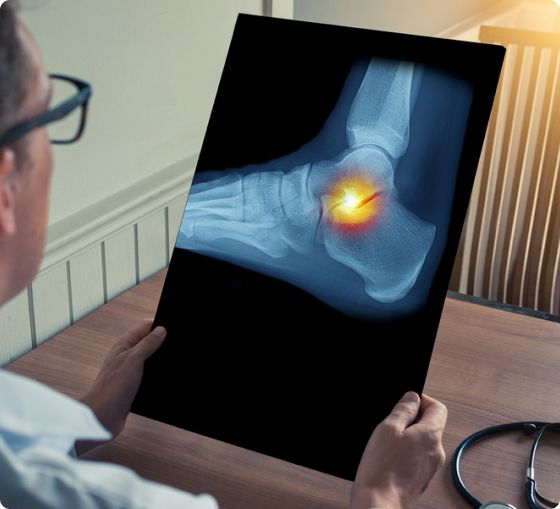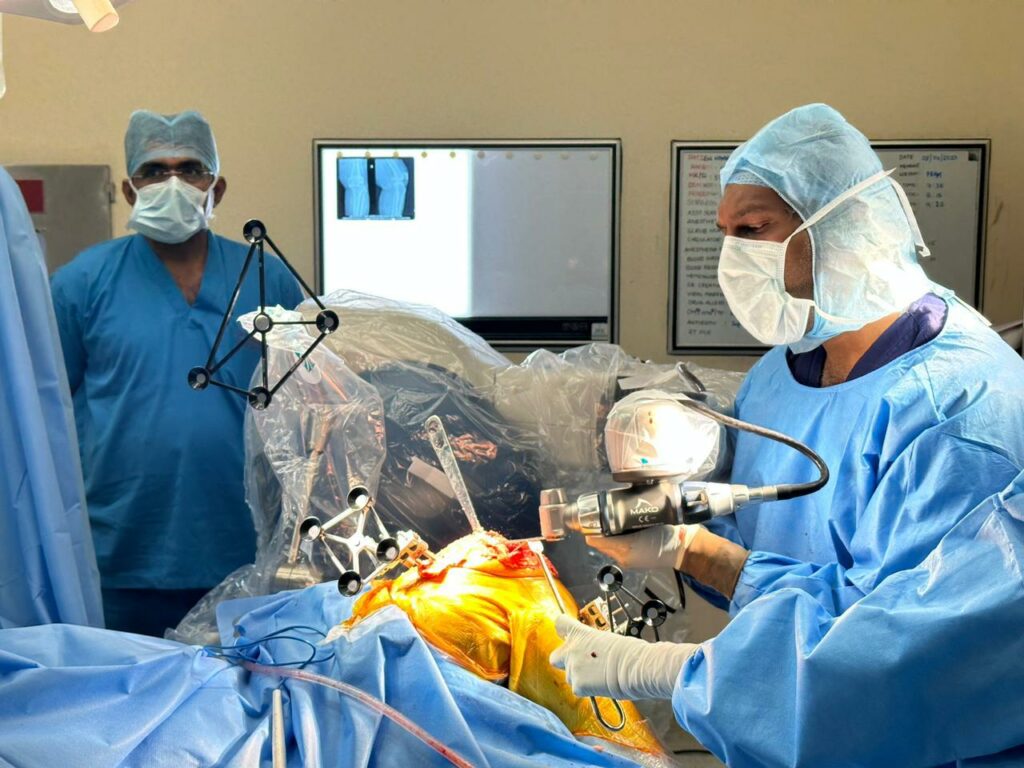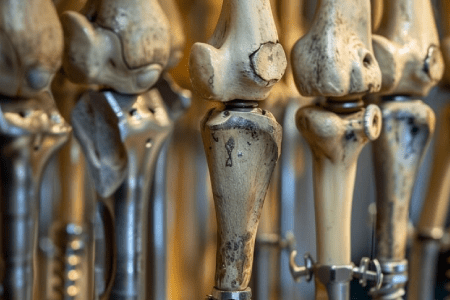Complex Fracture Treatment in Hyderabad
Dr. Praful’s Orthopedic Clinic, Malakpet
with
Advanced Diagnosis & Expert Care by Dr. Kilaru Praful
Complex fractures require precise diagnosis and expert care for proper healing. With 17+ years of experience, Dr. Praful Kilaru provides trusted Complex Fracture Treatment in Hyderabad using advanced imaging, accurate assessment, and evidence-based non-surgical and surgical techniques to restore stability, mobility, and overall function, helping patients return safely to daily life.
What Is Complex Fracture Treatment?
Complex Fracture Treatment refers to a specialized medical approach focused on accurately diagnosing and managing severe bone injuries such as multi-fragment fractures, joint-involving fractures, pelvic injuries, and high-impact trauma-related bone damage. The main goal of complex fracture treatment is to ensure proper bone healing, restore alignment and stability, preserve joint function, and help patients safely regain movement and independence. These fractures often occur due to road traffic accidents, falls from height, sports trauma, or industrial injuries and require detailed imaging, careful planning, and advanced orthopedic expertise. Treatment is always personalized, taking into account the type of fracture, level of complexity, patient age, bone quality, activity level, and overall health, to achieve the best possible long-term functional outcome.
Complex Fracture Treatment in Hyderabad – Specialized Care for Safe & Complete Recovery
Complex Fracture Treatment in Hyderabad focuses on the accurate diagnosis and effective management of severe bone injuries such as multi-fragment fractures, joint-involving fractures, pelvic fractures, and high-impact trauma injuries. The primary goal of treatment is to achieve proper bone alignment, ensure stable healing, preserve joint function, and help patients regain movement safely. Complex fractures commonly result from road traffic accidents, falls from height, sports injuries, or workplace trauma and often require advanced imaging, careful surgical planning, and specialized orthopedic expertise. Treatment is tailored to the type and severity of the fracture, the bones involved, and the patient’s age, activity level, and overall health, ensuring a structured, evidence-based approach that supports long-term recovery, mobility, and return to daily activities with confidence.
About the Dr.Praful

- 17+ Years of Excellence in Orthopedics
- MBBS, MS (Orthopaedics)
- AO Trauma Fellowship – Switzerland
- Arthroscopy & Sports Injury Specialist
- Senior Orthopedic Surgeon – Hyderabad
Struggling with a Complex Fracture? Here’s What You Should Know
Complex Fracture Treatment involves a specialized and structured approach to diagnose, manage, and heal severe bone injuries such as multi-fragment fractures, joint-involving fractures, pelvic injuries, and high-impact trauma. The main goal is to ensure proper bone alignment, stable healing, preserve joint movement, and help patients safely return to their daily activities. Complex fractures commonly occur due to road traffic accidents, falls from height, sports trauma, or workplace injuries and often require detailed imaging, careful planning, and advanced orthopedic techniques.
Timely Complex Fracture Treatment in Hyderabad is essential to prevent complications such as delayed healing, deformity, stiffness, or long-term disability. With personalized evaluation and evidence-based treatment plans, Dr. Praful Kilaru focuses on restoring strength, mobility, and confidence, enabling patients to return to an active and independent lifestyle.
Common Symptoms of Complex Fractures
Symptoms
- Intense pain at the affected area that increases when moving
- Visible swelling, bruising, or deformity around the fractured area
- Reduced ability or complete inability to walk or bear weight
- Restricted movement or stiffness in the affected joint
- Pain that increases with activity or even at rest

Common Causes of Complex Fractures
- Road traffic accidents causing high-impact bone injuries
- Falls from height leading to multiple or unstable fractures
- Sports injuries involving sudden force or collision
- Workplace or industrial accidents with heavy trauma
- Weak bones due to osteoporosis increasing fracture risk
Recovery Timeline for Complex Fractures
Recovery timelines for complex fractures can vary widely depending on the type of fracture, the patient’s age, and the treatment performed. Minor complex fractures typically heal within 8–12 weeks, while fractures involving major joints often require 3–6 months for complete recovery. More serious injuries, such as pelvic or acetabular fractures, may take 6–12 months due to their complexity. No matter the fracture, post-surgery rehabilitation is essential. With consistent physiotherapy, proper gait training, targeted muscle strengthening, and necessary lifestyle modifications, patients gradually regain mobility, rebuild strength, and move confidently toward a full return to daily activities.
Complex Fracture Treatment Options in Hyderabad
Non-Surgical Treatments
- Pain-relieving and anti-inflammatory medicines
- Immobilization using casts, splints, or braces
- Physiotherapy after initial healing to restore movement
- Regular imaging to monitor bone healing
- Activity modification for safe recovery
Surgical Treatments
- Internal fixation using plates, screws, or rods
- Minimally invasive fracture fixation where possible
- Joint-involving fracture reconstruction
- Pelvic and multi-bone fracture surgery
- Revision surgery for delayed or non-healing fractures

Diagnosis of Complex Fractures
Understanding how the injury happened
Checking pain, swelling, and movement
X-rays to identify the Bone fracture
CT scan or MRI for complex injuries
Why Patients Highly Recommend Dr. Praful
| S.No | Reason | Description | Category |
|---|---|---|---|
| 1 | Strong Educational Background | MBBS, MS Orthopedics, AO Trauma Fellowship (Switzerland) | Qualification |
| 2 | 17+ Years of Clinical Excellence | Successfully treated thousands of patients | Experience |
| 3 | Expert in All Orthopedic Conditions | Knee, spine, shoulder, fractures, sports injuries, pediatric cases | Expertise |
| 4 | Advanced Robotic & Minimally Invasive Surgery | Faster recovery, less pain, precise results | Technology |
| 5 | Honest, Clear & Ethical Treatment | Surgery advised only when truly required | Ethics |
| 6 | High Surgical Success Rate | Thousands of pain-free, satisfied patients | Outcomes |
| 7 | Easy Accessibility – Located in Malakpet | Patients visit from Dilsukhnagar, Amberpet, Chaderghat & more | Location |
| 8 | Excellent Patient Reviews | Known for communication, care & surgical skill | Reputation |
| 9 | Personalized Treatment Plans | Tailored care for every patient | Care Quality |
| 10 | Modern Diagnostic Tools | Accurate assessment with advanced imaging | Diagnostic Quality |
| 11 | Comprehensive Ortho Care | Covers trauma, joint pain, arthritis & sports injuries | Specialty |
| 12 | Friendly & Supportive Team | Smooth experience from consultation to recovery | Patient Support |
| 13 | Fast Recovery Protocols | Focus on minimal downtime and faster healing | Recovery |
| 14 | Transparent Communication | Clear explanation of treatment options | Trust |
| 15 | Affordable Treatment Options | Quality orthopedic care at reasonable pricing | Value |
| 16 | High Patient Satisfaction | Strong word-of-mouth recommendations | Social Proof |
🩺 What Causes Complex Fractures?
Complex fractures usually happen due to high-impact injuries or weakened bones. Careful evaluation helps decide the right treatment approach.
1. High-Impact Trauma
- Road traffic accidents
- Falls from height
- Sports or collision injuries
2. Bone-Related Factors
- Osteoporosis or weak bones
- Previous fractures or implants
- Age-related bone loss
3. Injury Complexity
- Multiple bone fragments
- Joint-involving fractures
- Pelvic or multi-bone injuries
Best Orthopedic Procedures for Complex Fracture Treatment
- Open Reduction and Internal Fixation (ORIF) Used for comminuted fractures with multiple fragments. Involves plates, screws, and rods.
- External Fixation Used in severe trauma, infected fractures, and open fractures for temporary or permanent stabilization.
- Intramedullary Nailing Preferred for femur, tibia, and humerus
fractures. - Limb Reconstruction & Deformity Correction Corrects length discrepancies or misaligned bones after complex trauma.
- Arthroscopic-assisted Fracture Repair Minimally invasive approach for joint-related fractures such as ankle, wrist, or shoulder.
- Revision Fracture Surgery Used for non-union, malunion, implant failure, or postoperative complications.

Happy Patients
FAQs
What is the best treatment for complex fractures?
Complex fractures are treated using ORIF, external fixation, intramedullary nailing, or limb reconstruction based on severity and location.
Where to get complex fracture treatment in Hyderabad?
Hyderabad offers advanced orthopedic trauma centers with expert surgeons equipped to handle high-risk fractures.
How long does recovery take for a complex fracture?
Recovery can take 3 months to 12 months, depending on fracture type and rehabilitation progress.
Why is rehabilitation important after surgery?
Rehabilitation helps restore movement, build strength, improve balance, and prevent stiffness. Without physiotherapy, recovery may be slower and mobilityComplex Fracture Treatment in Hyderabad may remain limited.
When can a patient walk after a complex fracture surgery?
Walking depends on the fracture’s location and stability. Some patients begin partial weight-bearing within weeks, while others need more time. Your surgeon and physiotherapist guide this safely.
What kind of exercises are required during recovery?
Exercises include gentle mobility routines, muscle strengthening, balance training, and gait correction. These are always personalized based on the fracture and healing stage.
Are complex fractures painful during recovery?
Complex Fracture Treatment in Hyderabad Some discomfort is normal, especially in the early weeks. Pain reduces as healing progresses, and physiotherapy helps manage stiffness and soreness effectively.
Can elderly patients recover fully from complex fractures?
Yes, with proper diagnosis, stable fixation, and guided rehabilitation. Bone density tests help doctors choose the safest treatment for elderly patients.
What imaging tests are used to diagnose complex fractures?
Doctors use digital X-rays, 3D CT scans, MRI, bone density tests, and ultrasound to understand the full extent of the injury before planning treatment.
What complications can occur if a complex fracture is not treated properly?
Untreated fractures may lead to deformity, non-union, chronic pain, nerve damage, and long-term mobility issues. Early treatment prevents most Complex Fracture Treatment in Hyderabad complications.
How soon should a complex fracture be treated?
Immediate evaluation is recommended. Early stabilization reduces pain, prevents further damage, and improves overall outcomes. Complex Fracture Treatment in Hyderabad
Are complex fractures treated differently from regular fractures?
Yes. Complex fractures often need advanced imaging, surgical reconstruction, and a structured rehabilitation program due to their severity.
What is the role of MRI in complex fracture treatment?
MRI scans show ligament, tendon, and soft tissue damage that are not visible on X-rays, helping doctors plan complete and accurate treatment
Can a complex fracture heal without surgery?
Some minimally displaced complex fractures may heal without surgery, but most require surgical fixation for stable healing and proper alignment.
Is it normal to feel stiffness after a complex fracture?
Yes. Stiffness is common due to immobilization and swelling. Physiotherapy gradually improves movement and reduces stiffness.Complex Fracture Treatment in Hyderabad
How important is lifestyle modification during recovery?
Very important. Nutrition, balanced activity, quitting smoking, and avoiding overloading the injured limb all support faster healing.
Will I regain full mobility after a complex fracture?
Most patients regain good mobility with timely treatment and dedicated rehabilitation. Severe fractures may require longer therapy but show steady progress.
What should I avoid during recovery?
Avoid heavy lifting, sudden movements, skipping physiotherapy, and walking without your doctor’s approval. These may delay healing.

